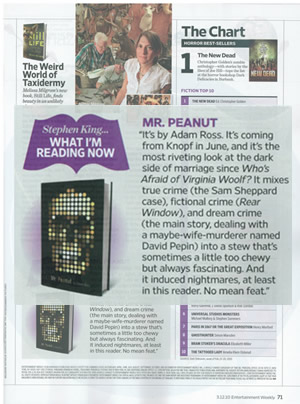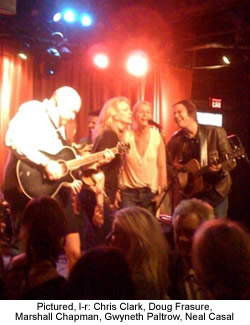Memphis, Bestseller City
What’s new in Tennessee books—and at Chapter 16—on March 4, 2010
If the graduate program in creative writing at the University of Memphis has anything to say about it, “Bluff City,” “M-Town,” and “River City” won’t be the only nicknames Memphis enjoys. Thanks to new books by Richard Bausch, Molly Caldwell Crosby, Dolen Perkins-Valdez, and the Publishing Juggernaut Formerly Known As Rebecca Skloot now garnering national coverage, it might be time to start calling Tennessee’s port on the Mississippi something more along the lines of “Bestseller City.”
Dolen Perkins-Valdez grew up in Memphis, graduated from Harvard, and then returned to her hometown, earning an M.F.A. from the University of Memphis in 1998. In January, she published her first novel, Wench, the tale of an enslaved woman whose role as a white planter’s mistress enables Perkins-Valdez to consider the issue of slavery from an unusual perspective. Barely six weeks after its release date, according to an article in the Memphis Flyer, the book has already gone into its sixth printing. This is a phenomenal showing for a first novel by a literary writer, but it’s perhaps not so surprising given the warm reception critics have given the novel: Kirkus Reviews called it “compelling and unsentimental.” Library Journal pronounced it “memorable,” and Publisher’s Weekly praised it as “heart-wrenching, intriguing, original and suspenseful.” To read an interview with Perkins-Valdez, click here, and to read the Chapter 16 review, click here.
Though he wasn’t on the faculty at the University of Memphis when Perkins-Valdez was a student there, Richard Bausch is now one of the program’s stars. His most recent novel won the Dayton Literary Peace Prize, an award he added to an already full shelf. (Prior prizes include a grant from the National Endowment for the Arts, a Guggenheim Fellowship, the Lila Wallace-Reader’s Digest Best Writers’ Award, the American Academy of Arts and Letters’ Award in Literature in 1993, and an O. Henry Prize, among others.) Now Bausch’s new collection of short stories, Something Is Out There is bringing in superlatives from the likes of The New York Times Book Review, where reviewer Maria Russo pronounced, “Nineteen books into his career, [Bausch] seems determined to keep witnessing an array of human sorrows with compassion and an admirable steadiness. Again and again, he excavates the darkest corners of his characters’ lives without giving in to despair.” Read the full review here, and to read an excerpt from the book, click here.
Meanwhile, Rebecca Skloot, Bausch’s colleague on the faculty of the University of Memphis, continues to rack up media coverage of her first book, The Immortal Life of Henrietta Lacks, which The New York Times Book Review calls “publishing’s Cinderella story of the season.” Last week, the book climbed to number three on the NYT‘s nonfiction bestseller list in its third week in shelves. To follow all the media coverage of Skloot’s phenomenal book, click here to read Chapter 16‘s continually updated story.
Former U. of M. visiting faculty member Molly Caldwell Crosby might not have chosen to publish her second book merely a month on the heels of the Henrietta phenomenon, but her own science book/detective story, Asleep: The Forgotten Epidemic That Remains One of Medicine’s Greatest Mysteries more than holds its own. According to Publisher’s Weekly, “The remarkable human connection Crosby brings to this scientific oddity helps enlighten readers about a pandemic forgotten in the shadow of the contemporaneous Spanish flu and till now memorialized only in Oliver Sacks’s Awakenings.” Even Oliver Sacks sings himself the book’s praises: “Molly Crosby has provided a brilliant and deeply moving account of the fearful years between 1915 and 1927, when this mysterious, worldwide pandemic struck, giving us vivid, intensely human portraits of seven individuals caught up in this epidemic, and the physicians who did their best to understand and help them.” To hear an interview with Crosby on NPR, click here. To read an interview with her on The Washington Post Express, click here. Read more about Crosby—as well as Bausch and Skloot—in this story in The Commercial Appeal.
Chapter 16 continues the celebration of Memphis this week by reviewing a book about a different side of artistic life on the delta: Blues, Booze, & Barbecue. Moving east, we also talk with Jimmy McDonough, author of a new biography of Tammy Wynette; Jennie Bentley, who is bringing out her third Do-It-Yourself cozy; and Coleman Barks, a Chattanooga-born poet whose translations of Rumi have made the thirteenth-century Sufi mystic one of the most popular poets in contemporary America. Why? “He felt the longing that is at the core of every religious impulse, and his poetry comes from there,” Barks tells Chapter 16′s Maria Browning, and it’s an impulse that goes “beyond all doctrines and bureaucracies, all churches and armies, and all politics.” To read the full interview, click here.

